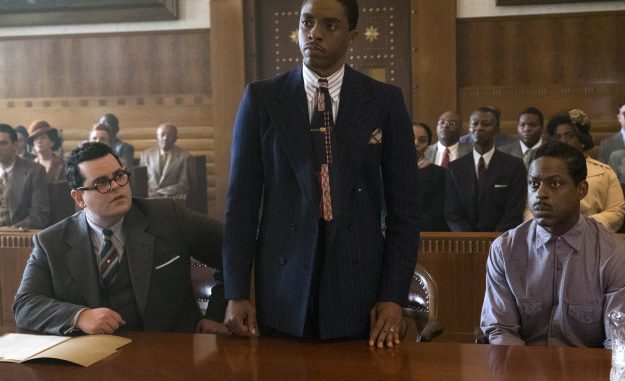
The upcoming film Marshall is set in 1941, two decades before Thurgood Marshall became the first black Supreme Court justice. It follows Marshall (Chadwick Boseman) as he’s tasked by the NAACP with representing Joseph Spell (Sterling K. Brown), a black chauffeur accused of raping and attempting to murder Eleanor Strubing (Kate Hudson), the wife of his employer. But the judge (James Cromwell) refuses to let Marshall speak for his client — literally. With Marshall’s voice stifled under the court’s threat of perjury, the task of keeping Spell out of jail falls to Sam Friedman (Josh Gad), a local insurance lawyer.
Despite the fact that Marshall is set more than 75 years ago, its explorations of racism, anti-Semitism, and domestic violence are still incredibly relevant. “I feel like we can fool ourselves sometimes into thinking we’ve gotten past certain issues, but the time has brought to the surface the level of ignorance and bigotry that exists currently within this country and within the world,” Brown said during a conversation with Boseman and Gad at BuzzFeed’s New York offices in late October. ”The film taking place in 1941 feels, in a strange way, contemporaneous, and for me, I think the next four years will be a time in which films like ours are going to help shine a light on the fact your shit stinks.”
Below is a conversation between Boseman, Brown, and Gad, in which they address social media’s impact on social justice, the responsibility they feel in Hollywood, and much more.
This interview has been edited for clarity and condensed.
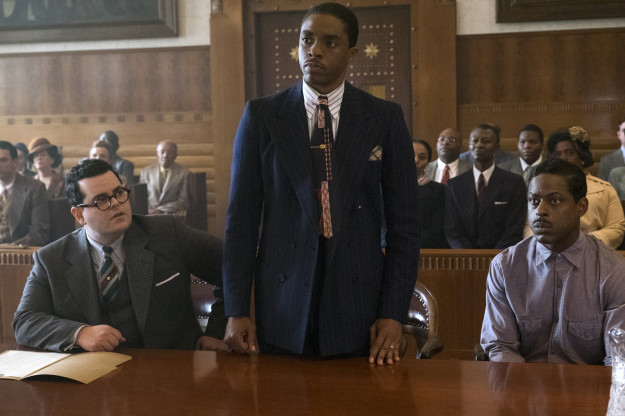
Gad, Boseman, and Brown in Marshall.
Barry Wetcher
I hesitate to use the word “glad,” but are any of you glad that this movie is coming out at this moment in American history?
Chadwick Boseman: The producers wanted it to come out last year. They wanted it to be shown at the Obama White House. I think things happen the way they’re supposed to happen. There’s no way of predicting the way people are going to interpret it, but the one thing I will say is, when people watch the news, there is a sense of anxiety and hopelessness. I feel like what this movie brings to the table is, Okay, we have been in these dark waters before and this is how we got out of them. We have been on the precipice of war before, just like in this movie, and we made it through by making those alliances, [by] seeking the truth. I think this movie is a light to that, and hopefully people see that.
Sterling K. Brown: I feel like we can fool ourselves sometimes into thinking we’ve gotten past certain issues, but the time has brought to the surface the level of ignorance and bigotry that exists currently within this country and within the world. The film taking place in 1941 feels, in a strange way, contemporaneous, and for me, I think the next four years will be a time in which films like ours are going to help shine a light on the fact your shit stinks.
CB: And it’s been stinking for a long time.
SKB: A long, long time.
CB: Yeah, I’m not glad that it’s happening during this time, but I’m glad that at a time like this, we have this [film] to present.
Josh Gad: I remember while we were filming discussing Ferguson a lot. Which was still relatively close, in proximity, to when we made the movie, and we all sort of saw a relevance in the film as it pertained to that event. Then something like Charlottesville happens and there’s a whole different context to put it in. Unfortunately, I don’t think it mattered when this movie came out, because these issues have clearly not been resolved. They’re clearly ongoing and uglier than ever. There’s just a new platform for it, and I think that, yes, it has a certain urgency that maybe it didn’t necessarily have before, but that message will only get more and more urgent. I hope this film exists outside an echo chamber and is a celebration of these men and the work that they were willing to do when it was not in their own best interest to do that work. And a message of hope. The NAACP was busy then, they’re as busy as they’ve ever been now, and their work continues to go on. To celebrate their efforts is also one of the great thrills of this movie because they’re working overtime now.
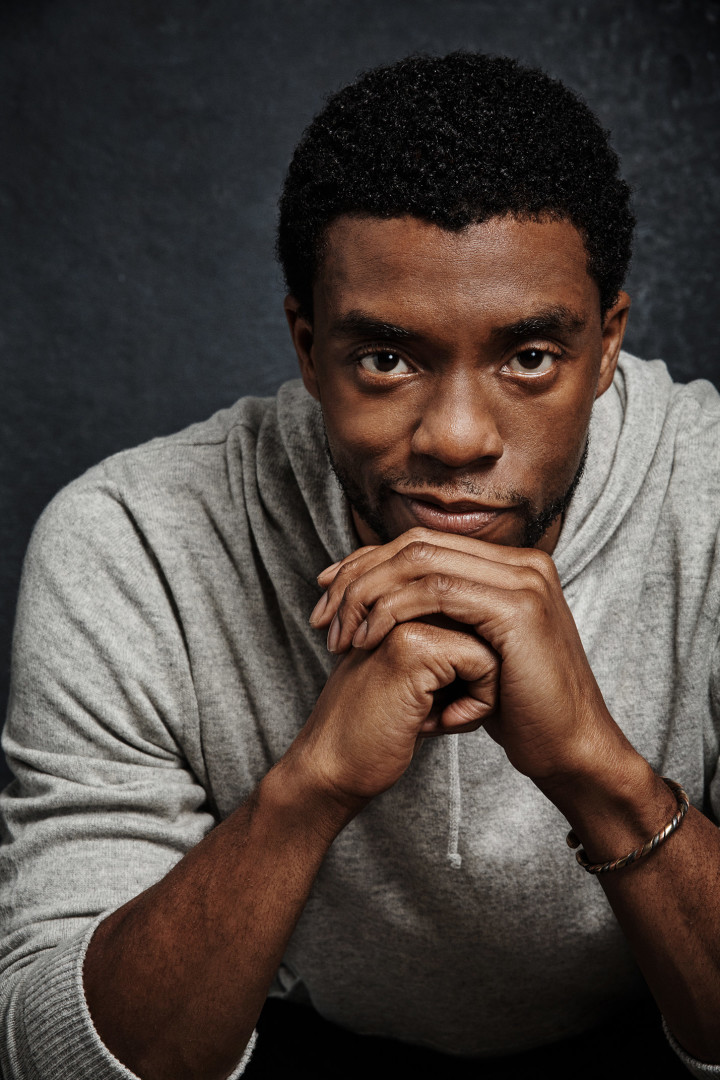
Chadwick Boseman
Matt Salacuse for BuzzFeed News
Social media has been instrumental in taking what are sometimes local stories and making them global issues. How important has social media been to social justice?
JG: I think it cuts both ways. I think it’s a very useful tool in terms of calling out things like bigotry and supremacy, but I think it’s also a platform for bigots and supremacists. It’s amazing because it’s instantaneous, it’s an opportunity to present your opinion, especially in the case of Twitter’s very direct manner, but that directness comes at a cost. And the problem is people speak in their respective echo chambers. You have the people who need to hear the message on one side not necessarily hearing it because their followers or the people they follow are all essentially patting each other on the back with the same message. I think it is an effective tool, but it’s just that — and like any tool, it can be a wonderful thing or it can be easily taken advantage of.
SKB: Agreed. You wind up preaching to the choir in both situations and the people you want to hear the message on the opposite side don’t necessarily hear it — or if they do, they just say, “It’s more of the same liberal thing you’re always pushing.”
CB: Previous to having such a strong voice through social media, protests would be covered in a one-sided way. I think because now social media has such a strong impact, it forces all of the major media groups to consider what is going to be said on the other side. Are people going to say we purposefully did not cover this? Even though I agree with everything said, I think it had to continue to be used as a tool so you can’t have all the news stations only showing it from one side.
“So much of being black in America is a matter of survival. If you are able to make it to a certain age — 40, 50, 60 — it’s achieving in spite of, rather than because of.”
Josh, your character starts off trying to abandon Spell’s case so he can maintain his fragile status quo but ends up becoming a much more conscientious person by the end. What appealed to you about Friedman?
JG: I think that the message is as relevant today as it, unfortunately, was in 1940. Reggie Hudlin, our brilliant director, made a comment yesterday that I thought was really apropos. It’s a movie that is also about alliances. Alliances in times like the one that’s represented in the film are so essential because you can’t fight without having people of like minds willing to take the chance despite all the adversity. That to me was really important.
This movie essentially is a superhero origin film, which I thought was fascinating. And it’s a real-life superhero. It’s [Marshall] who is out there without a cape but in a suit and tie, going from state to state facing the barrels of shotguns and willing to do the right thing, willing to say the right thing, willing to put his money where his mouth is and willing to fight for others to get to the same place he’s at — that woke place. And Sam Friedman is one of those people who’s awakened by this incredible legal mind and is willing to take the leap, despite his hesitations, despite the fact he knows there will be consequences.
All of those issues really spoke to me, and at the time we made it, Marshall had a certain relevance, and now in 2017, it’s taken on a whole different relevance. I don’t think any of us understood where things were necessarily headed, but it’s a testament to the fact that this piece we’ve done, despite the fact it takes place over 50 years ago, is as relevant today as it would have been then.
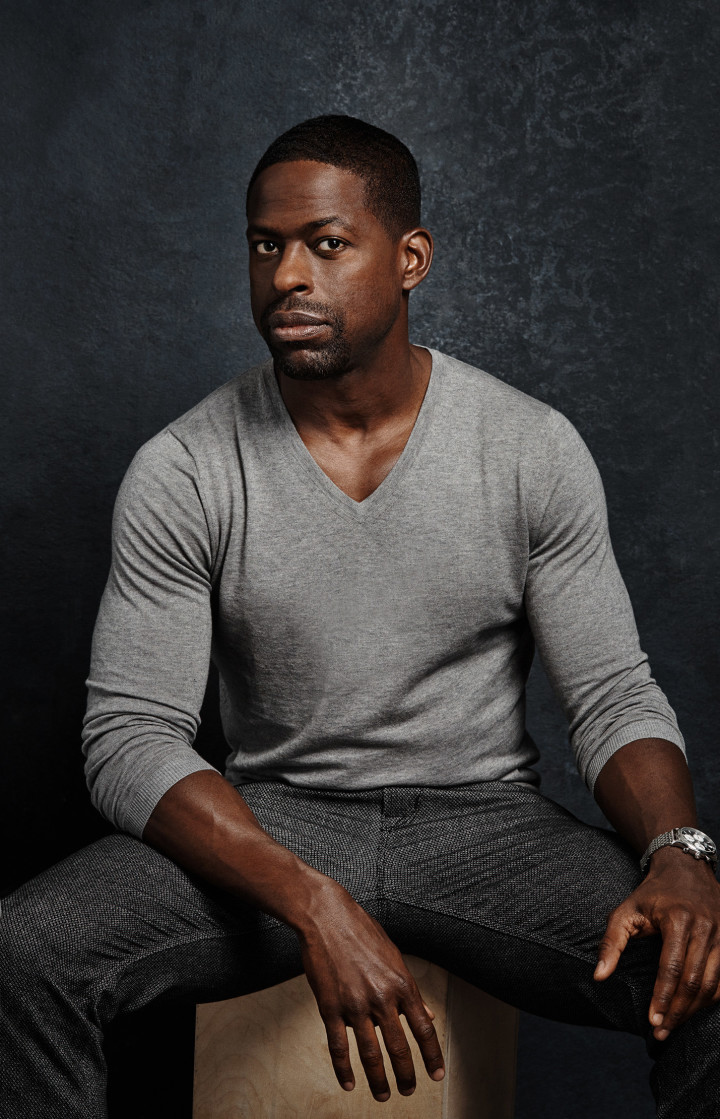
Sterling K. Brown
Matt Salacuse for BuzzFeed News
Towards the end of the film, Spell reveals the truth about what happened between him and Eleanor Strubing. He explains that the reason he lied about their consensual relationship is because that truth could have gotten him killed just as easily. Sterling, what went through your mind when you got to that part of the script?
SKB: So much of being black in America is a matter of survival. If you are able to make it to a certain age — 40, 50, 60 — it’s achieving in spite of, rather than because of. You are warring against institutions that are not out for your best interest. Miscegenation in parts of the country was a crime and sometimes punishable by death, and even if it wasn’t on the books, unofficially it was punishable by death. The idea of interacting with a white woman in the first place was something he knew was dangerous, so the fact this man put himself in a position where he was intimate with someone, he knew that was a bad, bad thing. So now what do I do? This woman has falsely accused me of something I didn’t commit, so now I’m sitting here in a jail cell — but what’s the alternative? Do I admit that I actually did what I did and be free where people can have easy access to me or do I just ride this time out? There’s no good thing. But I will say that Thurgood is able to make him understand that freedom has a cost and it means you have to put yourself in a position sometimes of being hurt.
Throughout the movie, it’s revealed that the judge and the prosecutor would strike unflattering comments from the record — which was openly happening at the time. It demonstrates the broken bedrock our criminal justice system is built upon. Why is it important to show that people were and are fighting a system that wasn’t designed, from the beginning, to benefit them?
CB: The law in our country is based on precedent. Precedent is set in one case and then used in another case and another case and another; and precedent has been set, in some cases, to keep prejudice alive. That is, to me, the beauty and the strength of Thurgood Marshall. Not only did he fight things as an attorney on the lower courts, but he lost in order to get cases to the higher court. Then he became a judge, and by becoming a judge, you now get to not only interpret law, change law, fight law, but you get to make law, so it can trickle back down and be corrected. That, to me, is why you do this movie, because Thurgood Marshall worked on every end of that spectrum that before had only worked against people that didn’t have a voice.
“You step in the shoes of someone who has done something incredible … and it becomes a part of you.”
The end of the film includes a real quote from Marshall where he says he’s not trying to put out fires, he’s chasing fire itself. Do you feel that encapsulates Marshall’s mission?
JG: It’s beyond significant. I hope it inspires a new generation of activism and of people who are willing to take on that fight, because going after fire itself requires a lot of sacrifice. It requires a lot of yourself. This brilliant legal mind is essentially muted, but he’s still able to create others in his image who are willing to take on the fight.
SKB: It inspires me. When I think about someone who had the legal mind and the ability to go out and protect these men, to defend these men at the risk of his own life, it makes me ask today, in 2017, now that I have a platform, how do I use my voice to try to move the needle? You forget that one man can really and truly make a difference, and the movie illuminates that in the most beautiful way.
In addition to Marshall, there’s a responsibility inherent in several of the characters you three have played. Sterling, you’ve talked about how important it is to you that This Is Us show Randall as an involved, engaged father. How meaningful has the audience reaction to that character been?
SKB: It means the world to me. Somebody was giving me a statistic that in the majority of the country, most people live in very insular circumstances where the majority of the people they interact with are of the same race as themselves. So when you have a chance to go into people’s homes on a weekly basis and share with them a human being they may not get to see with regularity and show his humanity, hopefully they can recognize, “Hey, that guy is like me.” I’ve had multiple instances, and they’ve become less and less as people know who I am, but where people cross the street or clutch their purse a little tighter. Maybe if you recognize humanity in all forms, then preconceived notions of who you think someone is can change. Little by little.
I would imagine there’s a different degree of responsibility involved when you play a real person. Chadwick, why do you think that’s something you’ve repeatedly been attracted to?
CB: You step in the shoes of someone who has done something incredible and you start to feel certain things that they feel and it becomes a part of you, essentially. If I only live my life, that’s one thing; but if for a second I can feel a little bit of what made this person great, what does that do to me? What comes from that experiment? That’s what it is: having the opportunity to, for a second, live a different life and grow from it in a way you can’t do with your own.
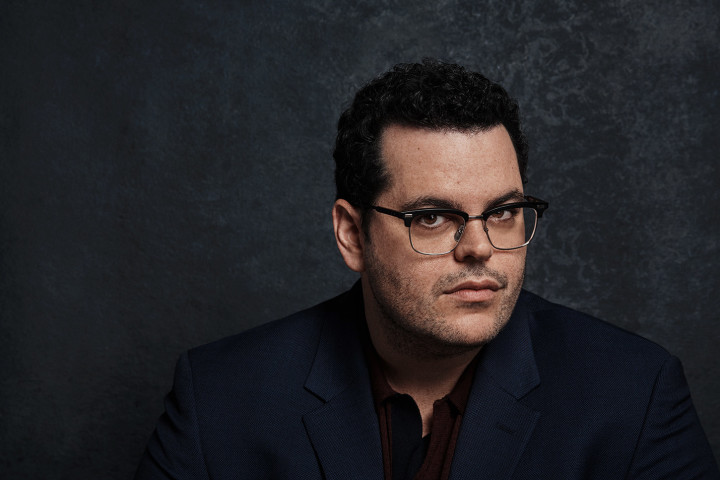
Josh Gad
Matt Salacuse for BuzzFeed News
Josh, you’ve talked about the sick kids you call as Olaf. Does knowing how important this character is to so many children raise the bar for what deems a sequel worthy of making?
JG: John Lasseter, who is in charge of both Pixar and Disney Animation, is such a perfectionist, he never wants to do anything unless it’s worthy of continuing the story. Frozen 2 wasn’t something that was just hatched because the first one was successful. It was because there was more story to tell. It’s scary. You create characters that are indelible and then you have to keep telling their stories, and it is that thing where people loved it first time out of the gate, how do I make sure to keep the audience excited and engaged so it doesn’t just become a rehash of their same expectations? That to me is part of the fun of what we get to do.
“I want to see a diverse enough landscape where everybody gets a chance to shine.”
Chadwick, there are obviously a lot of expectations that come along with playing Black Panther, so what was it like to be at Comic-Con and hear everyone lose their minds when they saw the first trailer?
CB: Oh man, people were crying. I started crying. I think I was the only person up there, other than Ryan [Coogler, director], who had seen pieces of it — and [Marvel president Kevin] Feige, of course. I knew when we were watching it that nobody knew Kendrick [Lamar’s song “DNA”] was gonna come in and it had already completely slayed everybody before it got to that! Everybody was losing their minds, and I was like, “They don’t even know this music is about to drop right now!” The first time I ever heard Kendrick’s song, I said, “They’re going to use that in the trailer.” I knew it. So when it was about to come in, I said, “Watch this.” And it was literally like pandemonium. As soon as that song came in, it was a wave of energy! People were crying. I was like, “This is like a Michael Jackson concert.” Literally.
What goes through your mind when you see that reaction?
CB: I hope the movie lives up to it! [laughs]
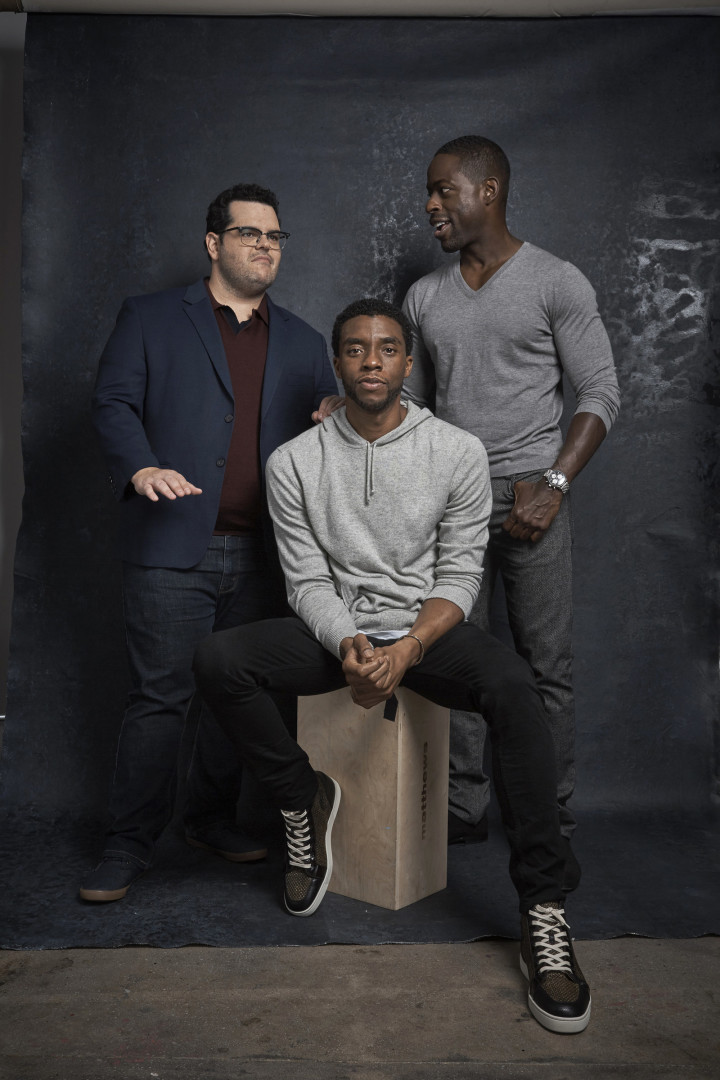
Gad, Boseman, and Brown.
Matt Salacuse for BuzzFeed News
Sterling, Hollywood loves the “overnight success story” narrative, but you’ve worked very hard in a lot of thankless roles to get where you are now. Does that make what’s happening even richer, since you know what the other side of that coin looks like?
SKB: I would say so. I look at people who get theirs early on in life; can they truly have the appreciation for it? Some do. But that was not my story. For 15 years or so, it was toiling away in obscurity, hoping that a costar could turn into a guest star could turn into a recurring could turn into possibly a series regular. This moment is really lovely. The level of talent I get to work with now, the opportunities that are coming my way are really nice. Before, I was on the outside looking in like, “Oh man, I know Chad’s gonna get that. It’ll be cool.” Or “I know [Anthony] Mackie’s gonna get it.” You know what I’m saying? Whoever the person was — Idris [Elba] — but now it’s like, “I may be able to get a shot at this joint!” It’s good, it’s really great, and I think because of the beginning, I’m never in worry of my feet floating off the ground, because it’s easy come, easy go. I want to see a diverse enough landscape where everybody gets a chance to shine, everybody gets a chance to eat, and not just a tasty side dish, but folks are getting some meat and potatoes in their bodies and contributing to the conversation and putting characters into the world of substance that are complicated, that are intriguing, that everybody gets a chance to see a reflection of themselves on the big screen.
Like, when you talk about the Panther, when I saw that trailer, I was like, “Oh, damn” — and I read the script! I read it, I have a small part, I’m in it too, but it’s like, “I can’t wait for this joint.” This is gonna be hot.
CB: I’ve had that similar feeling of being on the outside looking in and seeing over a period of time how the industry has changed and what opportunities for people of color have presented themselves. That [Brown] and I can actually be in this movie together, whereas there was a period of time where it would only be one person. And we know who that one person is. It’d be Denzel [Washington] in this movie, it’d be [Laurence] Fishburne in that movie, Sam Jackson in that movie, and Morgan Freeman in this one. It’s very few opportunities like Glory where you would see them — Mo’ Better Blues, you have Denzel and Wesley [Snipes] — working together. I feel blessed to be in a time where I can do this movie with him … and I can do a movie with Michael B. Jordan and it’s okay. It doesn’t even have to be such a big deal, because the opportunities are not so scarce. And that’s an important moment to note.
You have people, and you know exactly who I’m talking about, they hope you do bad because they want your spot. Not knowing that your spot was never for them in the first place. They have a spot, and if they do the things to get to their spot, they’ll have their spot. And it’s just as good as mine. Just to have that sort of sense that it’s a shift, and I can appreciate [Brown] and I can appreciate Michael and I can appreciate David [Oyelowo] and I can appreciate … Idris and appreciate their work and love their work and not feel this competition. I mean, we’re always going to compete, but competition in a healthy way. I love that. I think some people don’t know we’ve gotten to that point, so I’m saying it out loud. And it’s important to note because that determines how you proceed. If you’re proceeding in the wrong way, therefore you’re going down the wrong avenue, and if you just do your lane, you’ll get to your thing.

